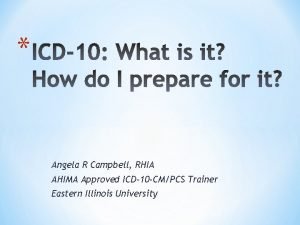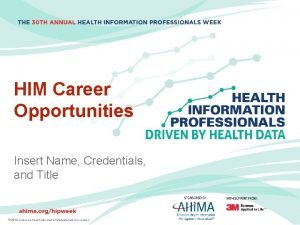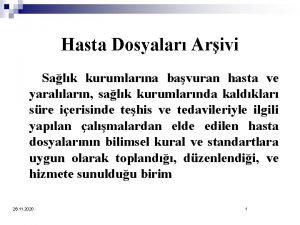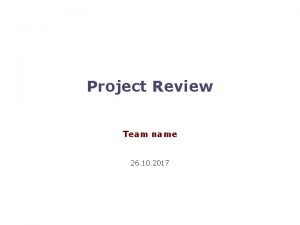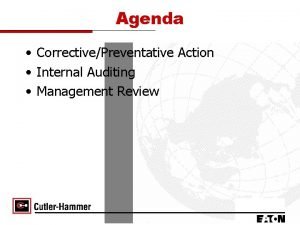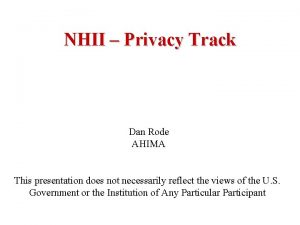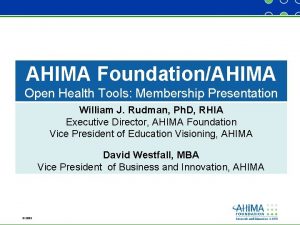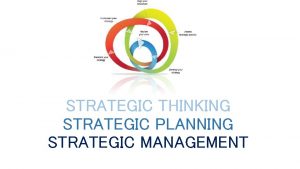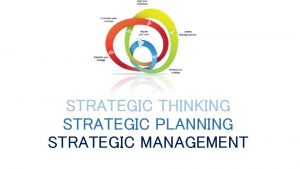Strategic Planning 3312016 Agenda Review AHIMA Strategic Plan









- Slides: 9

Strategic Planning 3/31/2016

Agenda • Review AHIMA Strategic Plan 2014 -2017 Summary • Review Ma. HIMA Strategic Plan 2015/2016 • Revise Strategic Plan 2016/2017 and beyond

AHIMA Strategic Plan 2014 -2017 Goal I - Informatics • Transform Data into Health Intelligence The focus in healthcare is shifting from the ability to collect data to the ability to govern and use it effectively. Needs are evolving from simply translating data to providing instant access to intelligence that can drive clinical and administrative decision making in real time. Healthcare organizations will depend on HIM professionals as leaders across all healthcare sectors, with expertise in predictive modeling of clinical information, trend analysis, and revenue cycle management.

AHIMA Strategic Plan 2014 -2017 Goal II - Leadership • Develop HIM Leaders across All Healthcare Sectors HIM professionals are often perceived as being focused on tasks rather than strategy. To move the industry forward, HIM directors must recruit the best and the brightest and develop their current workforce to provide innovative solutions for capturing, processing, and creating intelligence based on health data. They must proactively offer their knowledge and decision support expertise as they become more integrated into organizational leadership, with AHIMA providing support and training to allow them to feel confident in doing so.

AHIMA Strategic Plan 2014 -2017 Goal III – Information Governance • • Be Recognized as the Healthcare Industry Experts in Information Governance Effective enterprise information management in healthcare requires governance at both the data and information levels to improve healthcare. The need for this governance in healthcare is being driven by the rapid rate of adoption of health information technology, the demand for health information to measure quality and performance outcomes in healthcare delivery, and the need for the use of clinical and financial data. If the following areas are not addressed, organizations may be unable to achieve the full benefits: 1. The accountability framework and decision rights required to ensure effective use of health information across the enterprise 2. The defined processes, skills, and tools to manage information as a critical business asset throughout its life cycle 3. Essential standards, rules, and guidelines for functioning in an increasingly

AHIMA Strategic Plan 2014 -2017 Goal IV - Innovation • Increase Thought Leadership and Evidence-based HIM Research Evidence-based research is rapidly increasing in provider settings as more and more data become available. Providing focused opportunities for research will advance the role of HIM in informing clinical practice and developing standards to improve data quality, informatics, and information exchange, and help organizations transition to the EHR. It will also position HIM experts on the forefront of healthcare strategy, using data-driven outcomes to predict trends and support decision making. The use of data creates great value for organizations and for society and allows a proactive approach to individual and population health.

AHIMA Strategic Plan 2014 -2017 Goal V – Public Good • Empower Consumers to Optimize Their Health through Management of Their Personal Health Information Consumers of healthcare have historically had limited access to their health record. EHRs and other technologies are slowly making it possible, for the first time, for patients to view or even amend their health record when not in the hospital. However, the United States is far from widespread adoption of personal health records (PHRs) or patient portals.

Ma. HIMA Strategic Plan 2014/2016 – Where are we? • Student Engagement • Collaboration with other associations having similar or complimentary missions • Increase member participation by use of technology

Ma. HIMA Strategic Plan 2015 and Beyond • What will Ma. HIMA do to: – Support AHIMA Goals – Respond to issues revealed in environmental scanning
